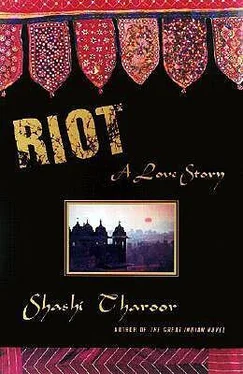Neither can his wife, of course. Lucky tells me that she keeps asking him why he makes such a point of his principles, why can’t he just let well enough alone? Why rock the boat? Doesn’t he care about her convenience, and the child’s? Lucky says rather bitterly that the rank, the house, the car, the servants are all she cares about. “The supreme vice,” he quotes Wilde again, the disillusioned Wilde of “De Profundis” (go on, look it up, Cin!), “is shallowness.” And Geetha is irremediably shallow. Lucky thinks she should have married the batchmate who drank himself into oblivion the day he got his IAS results, singing “Meri zindagi ban gayee!” (“I’m made for life!”) at the top of his voice in the street. There are eight million civil servants in India, if Lucky’s right (and he usually is!). The few hundred members of the IAS are the top of that heap, and in places like Zalilgarh they ARE the government. Ordinary people are so dependent on the government here for everything — from food rations to maintaining law and order — that Lucky really has power over the terms of their daily survival. He gave me a sardonic little poem about his own elitism:
I Am an Indian
I am an Indian, dressed in a suit and tie;
The words roll off my lucid tongue in accents long gone by;
I rule, I charm, protest, explain, know every how and why.
What kind of an Indian am I?
I am an Indian, with a roof above my head;
When I’ve had enough of the working day, I fall upon my bed;
My walls are hard, my carpets soft, my sofa cushions red.
What kind of an Indian? you said.
I am an Indian, with my belly round and full;
When my kid gets up in the morning she is driven to her school;
And if she’s hot, the a/c’s on, or she’ll splash into the pool.
What kind of an Indian, fool?
I am an Indian, with friends where friends should be;
Wide are the branches of my extensive family tree;
Big businessmen and bureaucrats all went to school with me.
I’m the best kind of Indian, you see.
from Katharine Hart’s diary
October 12, 1989
The HELP-US extension worker, Kadambari — I didn’t get the rest of her name, a rather plain woman with a dark sallow face, wearing a white cotton sari with a navy-blue border, her hair severely pulled back and plaited — took us to Priscilla’s place today.
Zalilgarh is just as bad as I feared. The heat radiates toward you in waves, as if some celestial oven is being opened and stoked in your face. The traffic is a torrent, raging rivers of vehicles and bodies in constant motion, streams of bicycles wending their way past thin cows, their ribs showing through their dirty skin, carts creaking past drawn by skeletal buffaloes, clangorous buses blaring their horns as they rattle and belch their way across town. And everywhere, people: half-dressed beggars with open sores clamoring for money, ash-smeared sadhus in saffron waist-cloths and matted hair, men in dhotis and men in pants and men in kurta-pajamas, and most strikingly the women, in multicolored saris of cotton and nylon, glittering with golden bangles and silver anklets. Vendors hawk their wares on the street — savories served on dried palm leaves, peanuts in cone-shaped packets made of old newspapers, sugarcane juice pressed into grimy tumblers — as flies buzz around everything. A listless gust of air blows a couple of sheets of paper at us from a hawker’s basket, and they turn out to be exam papers, still unread and unmarked, sold by impoverished teachers for the few pennies they will bring, the dreams of schoolchildren reduced to encasing a few grams of spicy fried lentils. Everything is recycled in India, even dreams. Street urchins gambol amid the refuse; a man relieves himself against a wall daubed with the campaign slogans and election symbols of two competing political parties. Above us, a vision of the infinite, as a murder of crows, cawing and wheeling in the brilliantly blue sky, points our way to Priscilla’s last home.
We had to walk down a narrow side-street, a gully they call it, to get there. The sidewalk was strewn with moldering rubbish and it was all we could do to avoid stepping on the trash. The stench was unbearable. Stray dogs nibbled at the scattered refuse. The road was no better, its paving cracked and pitted. Dust rose from every passing vehicle, mainly bicycles and reckless yellow-and-black auto-rickshaws, though a couple of bullock carts rolled past too, their riders idly flogging the tired beasts who were pulling them. Loud noise constantly assailed us, the jangling of bicycle bells, the shouting of male voices, the phut-phut-phut of the auto-rickshaw engines, the blaring of Hindi film music from various storefronts. We walked past groceries, their spices impregnating the air; provision shops, with brightly colored plastic buckets on display; photo developers, testimony to Zalilgarh’s ascent to modernity. At the entrance to what had been Priscilla’s building, Kadambari stopped at a tiny tin shed housing a paan counter, where a grimy little man sat cross-legged in front of an aluminum table as flies buzzed around his wares. He seemed to recognize her, and without much ado expertly daubed lime paste on a bright green leaf before dropping betel nuts and multicolored supari masalas onto it while Rudyard and I watched. The paanwallah folded the bursting leaf into a triangle that Kadambari wedged into her cheek. I refused her offer to have one too, and we trudged up an exterior staircase behind her.
The weather is pleasant in October, cool by Indian standards, but Rudyard was perspiring as we climbed. The whitewashed steps were dirty, the wall splotchy with red stains from the paan juice that the building’s inhabitants casually spat on their way up, as Kadambari proceeded to do. Back in the ’70s, when I first came across those stains in Delhi, I assumed they were blood, and wondered whether the homicide rate was greater than reported or, worse, whether tubercular Indians were coughing up blood all over the city. The discovery that it was merely a combination of a national addiction and poor hygiene had come as a relief. But today, the red stains made me think again of blood, Priscilla’s blood, spilled by an unknown rioter with a knife, and I stumbled, suddenly blinded.
We reached a landing, two floors up, and entered the interior of the building. The corridor was dingy, lit by a single naked bulb dangling from a wire cord. Four identical wooden doors led off it to the apartments within; they were painted a garish blue, though the garishness was dimmed by dirt and assorted scratches visible even in the poor light. Two of the blue doors were closed but not bolted; one was open and a small child, milk dribbling down his chin, stared out at us round-eyed from the doorway until his sari-clad mother swished up from within and dragged him away. The fourth door, bolted and padlocked, was Priscilla’s. Kadambari pulled out a large key and let us in.
It was a small room, sparsely furnished, with a stone floor on which my daughter had placed a small throw-rug, and a single bed. It wasn’t really a bed in the American sense of the word, but a string-cot, a charpoy, its white strings sagging noticeably in the middle, with a thin cotton mattress on top. The bed was neatly made, with a stiff white cotton sheet, and a gaily colored Indian bedspread on top. I sat down heavily on it, imagining the impress of my daughter’s body, and ran a hand over the bedspread, resting it on the lumpy pillow, feeling the lump in my own throat.
Rudyard marched right in and took in the room — the bed, the rudimentary table that served as her desk, the Indian cupboard, or almirah, the solitary chair, the Grateful Dead poster nailed to the wall, the two pieces of luggage on the floor. She lived simply, my daughter, as we had expected. Half a dozen books were stacked on the table. There was a shortwave radio against the sole window, its antenna extended as far as it would go, straining, I imagined, for news and music from home. It was her only luxury: there was no television set, no telephone. A pedestal fan, signs of rust beginning to show on its casing, stood unplugged in a corner; it was all that Priscilla had to keep off the heat whenever Zalilgarh’s erratic electricity supply allowed her to run it. The bathroom was tiny, with an Indian-style squatting toilet, and a tap and a bucket on the floor to bathe at. How had she coped, my baby? Never once had she complained about her living conditions.
Читать дальше












